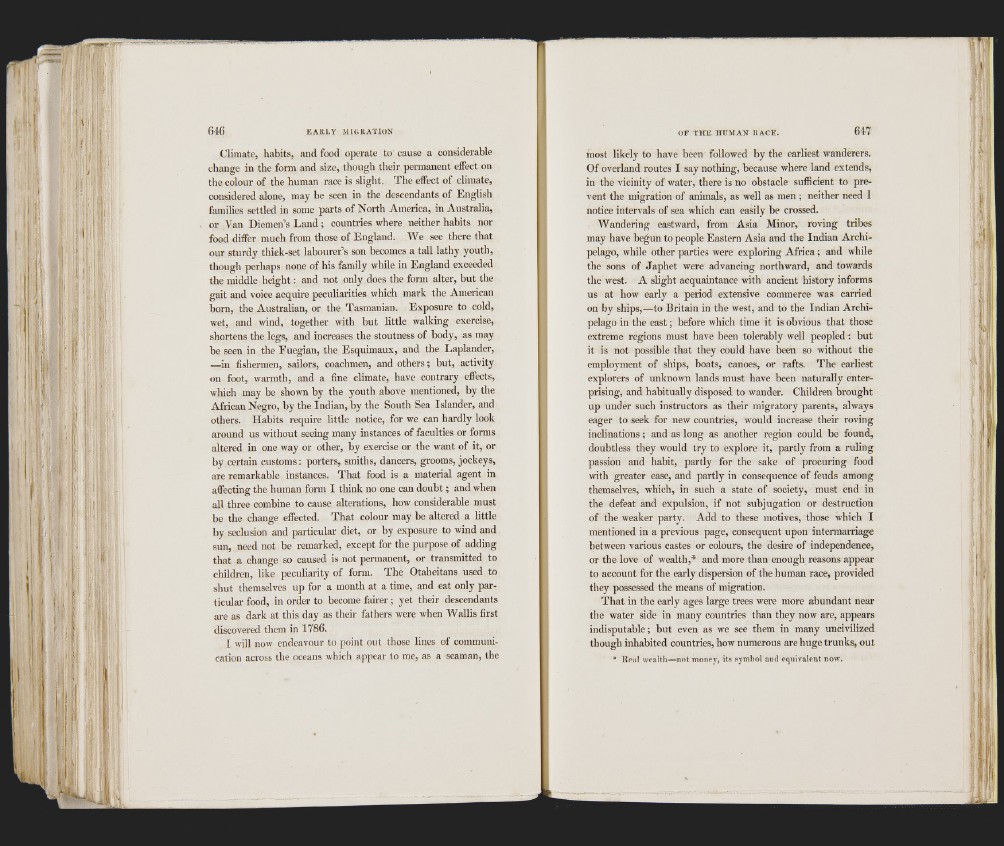
Climate, habits, and food operate to cause a considerable
change in the form and size, though their permanent effect on
the colour of the human race is slight. The effect of climate,
considered alone, may be seen in the descendants of English
families settled in some parts of North America, in Australia,
or Van Diemen’s Land ; countries where neither habits nor
food differ much from those of England. We see there that
our sturdy thick-set labourer’s son becomes a tall lathy youth,
though perhaps none of his family while in England exceeded
the middle height: and not only does the form alter, but the
gait and voice acquire peculiarities which mark the American
born, the Australian, or the Tasmanian. Exposure to cold,
wet, and ivind, together with but little walking exercise,
shortens the legs, and increases the stoutness of body, as may
be seen in the Fuegian, the Esquimaux, and the Laplander,
—in fishermen, sailors, coachmen, and others; but, activity
on foot, warmth, and a fine climate, have contrary effects,
which may be shown by the youth above mentioned, by the
African Negro, by the Indian, by the South Sea Islander, and
others. Habits require little notice, for we can hardly look
around us without seeing many instances of faculties or forms
altered in one way or other, by exercise or the want of it, or
by certain customs; porters, smiths, dancers, grooms, jockeys,
are remarkable instances. That food is a material agent in
affecting the human form I think no one can doubt; and when
all three combine to cause alterations, how considerable must
be the change effected. That colour may he altered a little
hy seclusion and particular diet, or hy exposure to wind and
sun, need not be remarked, except for the purpose of adding
that a change so caused is not permanent, or transmitted to
children, like peculiarity of form. The Otaheitans used to
shut themselves up for a month at a time, and eat only particular
food, in order to become fairer; yet their descendants
are as dark at this day as their fathers were when Wallis first
discovered them in 1786.
I will now endeavour to point out those lines of communication
across the oceans which appear to me, as a seaman, the
most likely to have been followed by the earliest wanderers.
Of overland routes I say nothing, because where land extends,
in the vicinity of water, there is no obstacle sufficient to prevent
the migration of anima,ls, as well as men ; neither need I
notice intervals of sea which can easily be crossed.
Wandering eastward, from Asia Minor, roving tribes
may have be^un to people Eastern Asia and the Indian Archipelago,
while other parties were exploring Africa ; and while
the sons of Japhet were advancing northward, and towards
the west. A slight acquaintance with ancient history informs
us at how early a period extensive commerce was carried
on by ships,—to Britain in the west, and to the Indian Archipelago
in the east ; before which time it is obvious that those
extreme regions must have been tolerably well peopled : but
it is not possible that they could have been so without the
employment of ships, boats, canoes, or rafts. The earliest
explorers of unknown lands must have been naturally enterprising,
and habitually disposed to wander. Children brought
up under such instructors as their migratory parents, always
eager to seek for new countries, would increase their roving
inclinations ; and as long as another region could be found,
doubtless they would try to explore it, partly from a ruling
passion and habit, partly for the sake of procuring food
with greater ease, and partly in consequence of feuds among
themselves, which, in such a state of society, must end in
the defeat and expulsion, if not subjugation or destruction
of the weaker party. Add to these motives, those which I
mentioned in a previous page, consequent upon intermarriage
between various castes or colours, the desire of independence,
or the love of wealth,* and more than enough reasons appear
to account for the early dispersion of the human race, provided
they possessed the means of migration.
That in the early ages large trees were more abundant near
the water side in many countries than they now are, appears
indisputable; but even as we see them in many uncivilized
though inhabited countries, how numerous are huge trunks, out
• Rpul wealth—not money, its symbol and equivalent now.
i l l
U:
'ftii
i/ii! *1ii
d
i i
1
Mti